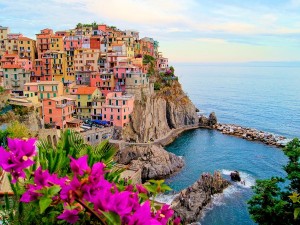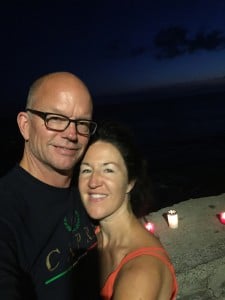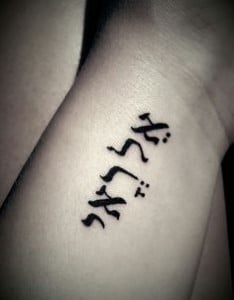Trips of a lifetime are etched into our memories, this one for different reasons than we had hoped. Even so, it has changed my life, and my leg, forever. With the plays of London, the Scottish mist and prayers from Iona lingering on our tongue and the wine of Siena and Florence still on our lips, my wife, Brooke and I, headed for the Cinque Terre, to stay in the southernmost village of Riomaggiore on the Italian Riviera coastline.
Our train chugged through the underbelly of the mountain tunnel, snaking slowly through the dark. The light at the end beckoned. Little did we know, however, what that light would bring. At first, we were ushered into the drama of sheer cliffs, ripe in bloom, diving into the Mediterranean. Arriving at the station, we hauled our luggage out into a whole new world of cobble-stoned paths, tangled around a medieval village. We pulled our luggage up a steep, narrow path, trekking another mile along the edge of the cliff, overlooking the Mediterranean. Scrambling the parts that were closed off and crumbling, I peeked over the edge. It was a long drop to the sea—this village built into cliff-side rock seemed simultaneously firm and fragile—an omen of things to come.
Finally arriving at our old fishermen’s dwelling, carved from rock, we were thrilled to have a small air conditioner to cool the 95-degree heat. Then within a minute, bathing suited, we went back out again, stopping only for a second to wonder at the Mediterranean view off our deck. After a week of celebrating with a group 40 friends and family in Siena, we were ready for rest.
We slowly made it down the steep weaving staircases into the center of town—without much imagination one could see that the city hadn’t changed much in its long seven-century history. Apartments and storefronts were all built into the cliffs themselves and seemed to have been there for as long as people had inhabited the place. From the pictures in Rick Steves’ book, we realized this was only the beginning to various villages up the coast, each more spectacular than the next, towns perched a mile up looking down on bays, shimmering in the turquoise green of the Mediterranean. We looked forward to the exploration. But they were towns we would never see….
Eager to climb the cliff path overlooking the ocean, we caught a glimpse of our destination—the “swimming hole” of Riomaggiore, a crystal clear horseshoe bay—calm and protected, so we thought. There was no sand to speak of— indeed the beach was an intricate and spectacular patchwork of boulders, some smooth and inviting, others ominous and gigantic in size.
Scrambling down the rocks, we found a place that looked safe and relatively easy to enter the water. We slid in to find the sea lovely and a refreshing calm. Looking down, 20 to 30 feet from our swimming legs, large fallen boulders from surrounding cliffs covered the ocean floor below.
After twenty minutes of lazily paddling about and taking in the jagged surrounding beauty I suggested to Brooke that we might go perch on a rock and sun a bit. She agreed, and we swam slowly over. Brooke climbed up first and just as I was about to join her, a large cruise ship wave, which neither of us had noticed, came crashing in between the two large boulders, and in that narrow space, the surge upwards of the water crushed my right shin into one of the boulders and tossed me down underneath the surface; at once I felt incredible pain and panic. Brooke frantically tried to reach for me in the swirling waters, but to no avail.
Under the waters, I knew my shin was hit, but wanted in the worse way both to imagine that it wasn’t that bad and to wish away any injury that would interrupt the loveliness of the moment. I surfaced from the undertow to Brooke yelling, “Swim away! Swim away!” as I pushed away from the rock. Brooke, fearful and concerned, joined me in the water, anxiously asking if I was ok. “I’m fine,” I replied–half because I wanted to hide my injury and half knowing that my shin hurt like hell. I also thought, “I bet staying in this cool sea water will help relieve the pain.” But I think we both knew that something was wrong.
The water relieved some of the immediate pain, but as I lifted my leg to glimpse my wound, I spied a ragged gash with two awkward punctures, resembling a shark bite. The salt water made the dangling flesh white and the water masked the bleeding.
As I climbed out of the water, blood gushed out of the wound. Brooke, who had always warned me that she would faint at the sight of a drop of blood, became alarmed, but there was no fainting in sight. She offered her sundress to staunch the bleeding. I refused. It didn’t hurt at that point, and the blood flow fascinated me—as if the bleeding could relieve the pain. We climbed up a quarter of a mile trail and reached a café perched on top when Brooke turned to me and said, “Sit down! Put pressure on your wound with these napkins. I’m getting help.” And I did just that.
Not too many minutes later, Brooke returned with a bottle of anti-septic and bandage roll. She flushed it and applied the bandage.
We then asked about any public assistance and were directed a half-mile up into the upper village. A pair of nurses quickly examined the shin. They cleaned the wound and put on plastic sutures to bind the loose skin. They then put a bandage around it and sent me off.
I thought, “Hot dog, I think we’re okay.” The leg felt sore, but walk-able. Making our way back to our fishermen’s hut, we changed and went to dinner at the downtown village cafe. The meal offered much needed relief—fresh Halibut, oysters and local vegetables. The Italian wine dulled my lingering discomfort. I thought, yes, perhaps this is the return of good things, and we smiled weakly in this after dinner picture to commemorate that we were out of harms way.
The meal offered much needed relief—fresh Halibut, oysters and local vegetables. The Italian wine dulled my lingering discomfort. I thought, yes, perhaps this is the return of good things, and we smiled weakly in this after dinner picture to commemorate that we were out of harms way.
I could not have been more mistaken. We got into bed and began to relax, but soon, my leg began to pulsate and throb. A fever ensued – Brooke charted it hourly, ranging from 100 to 103.7. By the middle of the night, despite her efforts to keep my fever down and clean my wound, I was writhing in pain and going through episodes of delirium. In my rare moments of sobriety, I mumbled, “I am in trouble.” Thoughts of losing my leg or worse, buried me in worry.
By morning, despite maximum doses of ibuprofen, the pain overwhelmed me. Brooke, with direction from her brother, Ben, an ER doctor back in the States, had drawn circles around the wound to track the growing infection—by morning, it had spread around my leg. Brooke went out to find help—begging the same nurse to come to our room. She looked at the shin, and recognizing the rapid rise of infection, told us to go to the hospital in La Spezia, a half hour away.
Due to the remote nature of the area, no taxi could get close to our room. We had to hike out a mile to get a ride to the hospital. My temperature piqued and mixed with the heat of the day to make it an oven-like experience. I collapsed in the back of the taxi, as each bump in the road sent tremors of pain up my shin.
The hospital, by American standards, looked dilapidated at best. Italians packed the emergency room—making me wonder what kind of care would await me. The taxi driver translated that the wait would be long, so Brooke had him call our Airbnb host family for other options. They offered to have us see their private doctor; we quickly accepted and returned immediately.
Back in our room, I dropped into bed. The blotches of blood that littered the lower half of the bed made me blanche—blood continued to ooze through the bandages. It looked like a war zone.
The Italian Doctor came in with an incongruous fanfare, yelling, “Americano?!” Speaking Italian he belted out English phrases like “John Wayne,” or “Viva America!” Without hesitation he took off my bandage, and plunged his unwashed index finger into to the wound. I thought, “What kind of nightmare am I in?”
Brooke, speaking Spanish to his Italian, pressed him to look at my fever temperatures, as well as the marks that showed the spread of the infection. He brushed her off, multiple times, yelling in Italian, “Silent women, calm down.”
The doctor repeated simply what the paramedics had done the previous day, dressing the wound and then gave me a mild anti-biotic form of amoxicillin. Mustering some hope that relief would follow, we told him of our plans to fly to Dublin in two days, and he pronounced his approval and certainty over my healing.
However the night multiplied the nightmarish reality of the night before. I slept only intermittently, and in the pain and feverish delirium began a long night of trying to straiten my blankets, which always ended in utter failure. My mind sought some way to order the situation, ending in utter helplessness. My body careened from hot to cold. I would sleep for a bit but then wake in terror, as pain would shoot up my leg. Meanwhile, Brooke, seeing that the Dr’s were no help went about the village trying to find stronger antibiotics and cleaning solutions.
At one point the next morning in a fit of desperation, I pronounced to God out loud, “Hey, I get your point, you want me to slow down; I get it, I get it; now, please take this pain away.”
My pitch failed, but it did bring to the surface the full ferocity of this crazy episode. My mind dangled at the end of the rope.
Brooke retrieved the “Americano” Italian doctor the next day. With his usual bravado, he pushed his naked finger around my wound and announced, in Italian, interpreted by our owner, “There may be sand in this wound, it needs to be debrided at the hospital.”
Realizing the seriousness of it all, Brooke asked our hosts to take us in their car to La Spezia and, if necessary, the 2 and a half hours on to Florence.
In a state of terror, we decided we would stop at the La Spezia hospital and if they took us immediately we would stay, otherwise we’d continue to Florence. The nurse at La Spezia took one look at me and led me into the examination room. The head nurse playfully shook his fist at me when he realized the Dr. had waited two days since the actual accident to send us in.
After some initial tests, a nurse came and led me, dragging my painful leg all the way, to another building, to the orthopedic surgeon. When we got to the room, the doctor said, “I speak English.” I briefed him, but then with no warning or explanation, he prepped my leg for my first debridement. He pressed multiple shots of anesthesia straight into the wound, then started cutting. I could feel and hear the dead flesh being carved out as he dug into the wound. At one point I yelped. He looked at me as if annoyed, and then stuck me with another shot of anesthesia. For a moment, I thought, “Am I in some kind of mad house?”
Quickly done, the assistant wrapped an anti-septic bandage around my leg, and said “Don’t take it off for three days.” The doctor typed into his computer. I asked some questions, but he sat silent. When I favored my leg as I got up, the doctor looked up and barked, “You can walk.” I limped out—madness, indeed.
We all got back into the car. I was exhausted, feeling, or hoping that some progress had been made.
In any case, we sped on to Florence.
Upon arriving in Florence, Brooke reserved a room at the Sisters of the Oblate Convent. A Medici building, stunning, though the accommodations were modest—two beds, a small commode, and thankfully, a portable AC. And Brooke got straight to work strategizing on how to return to the states as quickly as possible. She searched the streets for a working phone, went out and pleaded with the actual airport, and tried all the different airlines but it became clear that it would take another day and a half for an open flight.
We had just settled in and I relaxed on the bed, when Brooke looked down at my right inner thigh and spied a series of red lines coming up from the wound, along my veins. We thought we had seen the worse, but this put us both over the edge. I officially freaked out and Brooke pretended not to.
Ben had warned of the potential spreading of the infection, particularly up the leg and into the groin area—a potentially life threatening event. I felt cold with terror, “Honey, if something really bad occurs, call the girls, immediately.” I hadn’t told my daughters about the severity of the injury. I didn’t want them worrying.
We called a cab and went straight to the Florence hospital. On arrival, the nurse looked at my leg and told me to come back. He changed the bandage and I breathlessly told him my concern. He seemed either not to understand or not to be interested and then escorted me back to the waiting room, to remain for another hour—I was in a low-grade panic.
Finally, they ushered me into the main doctor’s office, where multiple nurses and aides scurried about. The doctor spoke excellent English, had a lovely smile and seemed attentive. The nurse gave him an evaluation, though downplaying my concerns.
Once again, I felt like Italian medicine was playing Russian roulette with my life.
Brooke began peppering the main doctor with questions, and finally when he began to send us away with the same, “Be quiet woman. Don’t worry so much,” Brooke grew much taller than her small 5’3″ frame and demanded that they do a blood test to check for infection. She had quite a few go-rounds, and finally won; “Okay,” he said, “we will take a blood sample.” The count came back with elevated white blood cells; the doctor agreed to a new anti-biotic, and a shot to prevent blood clotting.
The doctor ordered the anti-biotic rocefin, a daily shot into my rear end. The nurse, a man, who seemed less than enthusiastic to provide the services, looked at Brooke and pronounced in broken English, “Watch! You will do this each day. It’s easy. Don’t worry. You’ll be an expert soon.”
The shot doubled me over; I slumped onto the gurney in agony. They said it would be uncomfortable; it was horrific. The idea that Brooke could do these shots on her own seemed insane.
My doctor promised me that my health was secure and that only thing that I could anticipate was a significant scar. He suggested that we should continue on to Ireland for the last leg of our trip. A suggestion that I later learned could have been fatal.
The medical care at Florence put me at greater ease. It continued to be tough to sleep, however, the pain haunted me, along with the real and present danger that there was more going on than my Italian doctors had communicated.
When we returned to our room, Brooke put her hands over my wound directly and prayed. Remarkably, I felt waves of comfort and refreshment over the wound itself. I told her that a warm sensation entered my wound. We cried together—one of many times this happened—in the craziness and panic of those days, we looked at each other for consolation. In truth, I depended on her for my life—she fought for me, prayed for me, dressed and cleaned my wound, and, I know, saved my life.
And this dependence nearly destroyed me. I love to take care and provide for my friends and family. At that moment, God pronounced on me, “Hey, my son, this time, you will have no choice. Receive love.”
I rested most of the next day, and night, and luckily for my life, Brooke paid no attention to the Dr’s encouragement to go onto Ireland. She knew things were not as they should be and early that morning we got up at 3:30 am to catch a plane to Frankfurt, then a nonstop flight from Frankfurt to Seattle.
Upon landing, we immediately drove to the University of Washington Urgent Care. The wound stunned the doctor and she phoned the University of Washington Wound Care Center immediately; despite their full schedule, they made an appointment for the next day.
Upon entering the Wound Care Center, I felt relief. Not only was it incredibly professional, but the nurse looked at my wound and pronounced, “Wow, you are in the right place.” The doctor, an immigrant from Turkey, pronounced that if we had of continued on to Ireland, I might have lost my leg or worse.
They doctor explained this would be a long term healing process, with possible skin graphs as well as staying off my foot for at least a month or more. Finally, I could relax and trust my medical team.
Four weeks out from the injury I’m feeling better to be sure, but the voices of terror still swirl around my head. I have an haunting feeling that I dodged a bullet.
* * *
I’m still meditating on what this means. It is not that everything must have a meaning, but I’ve always loved Richard Rohr’s phrase, “Everything belongs.” That is, there are no accidents, no mishaps, which aren’t simultan eously divine directions or at least whisperings that the soul is afoot. We all have callings, echoes and murmurings of Spirit that we all too quickly pass by or forget.
eously divine directions or at least whisperings that the soul is afoot. We all have callings, echoes and murmurings of Spirit that we all too quickly pass by or forget.
And this last year I’ve done some wading in those backwaters of my soul, and they keep beckoning me into the depths. Or, as the Psalmist evokes, “deep calls to deep.” My therapist explained, “Jim, your strong, stubborn ego got you a long way, but the next round is not about your ego, but the deeper longings of your soul, regardless of what anyone else thinks or says, or whether it gets you more fame.”
I noticed that all too often I have been trying to row back into the regular waters of my ego that seeks recognition and gratification for myself, rather than turning to the projects that are my heart’s desire. It is a constant struggle.
The other day, Brooke read to me from Genesis 32. It’s the great story of Jacob, preparing (in fear) to meet Esau. Jacob sends his family, wives, livestock, and all that he has across the river, to go before him in advance. Jacob is left alone. And that night, he wrestles with an angel, whom Jacob refuses to let go. And so the angel breaks Jacob’s hip joint. But Jacob will not let him go until he receives a blessing. The angel does so, and Jacob is given a new name, a new sense of courage and humility to face his brother and fulfill his destiny. It is a God kick, if you will.
For me, this knock on the shin was just that. As if the Spirit is saying, “Once again, my friend, return, return to the work of your soul, and dig up the treasures that lay hidden in plain sight.”
This takes time and rest and prayer. My wife, Brooke, knows this movement so well. I chose her because she does her soul work, and it is her most important task in life.
I, too often, ply the knife-edge between my ego construction and the deeper waters of my soul, and, at times, the knife cuts, and I believe that is what happened. We either recognize these awakenings, or we fall back and are hurt and maybe even die. I pray that I got the message.
And I hope that this sticks. At least I know that if I do forget, the scar that is forming on my leg will scream, “Hey—remember! I’m waiting, wake up!”












